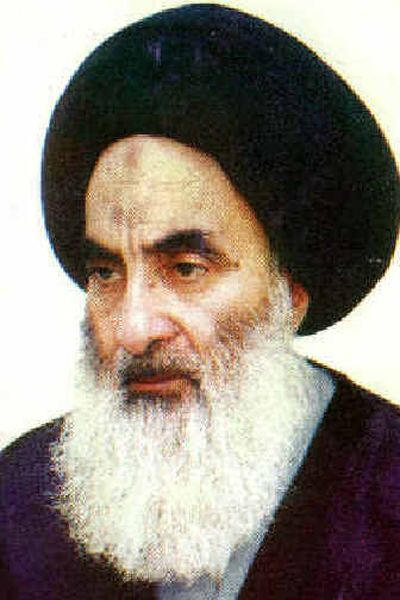Al-Sistani ticket likely to lead in Iraq election

BAGHDAD, Iraq – The candidate list endorsed by Iraq’s top Shiite cleric is likely to emerge as the dominant political group in Sunday’s election. But his followers said Monday they aren’t looking to create a cleric-led Islamic state, and expectations are they won’t be strong enough to govern on their own.
The bloc backed by Grand Ayatollah Ali al-Husseini al-Sistani probably will have to negotiate a governing coalition with other political groups, including rival Sunni Arabs, a minority that long had dominated Iraq’s Shiite majority.
At a news conference, politicians running on the al-Sistani-endorsed ticket, the United Iraqi Alliance, sought to ease any fears the bloc wants to install an Iranian-style Shiite state. Hanin Mohammed Qaddou, a Sunni Muslim on the ticket, said the issue of religious government is “not part of the program, and it will not be in the near future.”
Humam Hammoudi, a Shiite cleric allied with al-Sistani, said the United Iraqi Alliance has many members who oppose mixing Islam and politics. “Had this been our intention, we wouldn’t have let them join our list,” he said.
Al-Sistani, whose views are influential with most Shiites in Iraq, is known to oppose the idea that the clergy has a right to rule. He is, however, expected to insist that the constitution drawn up by the new National Assembly upholds Iraq’s Muslim traditions and does not include freedoms and practices violating the faith’s basic tenets.
Alliance leaders also vowed not to seek revenge for violence perpetrated by Sunni extremists, who make up most of the country’s insurgency.
“We believe that we have no justifications, whether religious or political, to escalate the situation and enter into the civil war quagmire because it means the Balkanization of Iraq or the Lebanonization of Iraq,” said Khudayer al-Khuzai of the Islamic Dawa Party-Iraq, which is in the alliance.
Iraq’s Shiites are estimated to make up about 60 percent of Iraq’s 26 million population. Shiites hope Sunday’s vote will give them political power they were denied for generations by Sunni Arabs.
Sunni Arabs are not expected to vote in large numbers, many in anger that the vote will formalize their loss of power and others in fear of insurgent attacks.
But ethnic Kurds hope a strong turnout in their northern region will bolster their case for self-rule.
The United Iraqi Alliance’s 228-candidate ticket is expected to fare the best among the 111 slates seeking the 275 seats in the National Assembly, which will appoint a transitional government and draft a permanent constitution.
Other major political tickets include a 233-candidate slate led by interim Prime Minister Ayad Allawi, a Kurdish list and tickets led by Adnan Pachachi, a Sunni Arab candidate, and interim President Ghazi al-Yawer, also a Sunni Arab.
In theory, based on demographics, candidates from the Shiite majority should win 150-160 seats, while Sunni Arabs and Kurds should get 40 to 50 seats each. Tiny minorities, such as Christians and Turkomans, are expected to share the rest.
But political observers expect the mostly Shiite ticket supported by al-Sistani to end up with about 100 seats, leaving it short of the 138 needed to control the assembly but giving it the strongest position to put together a governing coalition.
“The new government will be a coalition between various political parties. Some of those parties will be religious, and some will not be religious,” Pachachi said Monday in an interview with Associated Press Television News.
The United Iraqi Alliance includes the country’s two major Shiite political parties – the Supreme Council of the Islamic Revolution in Iraq and the Dawa Party.
The Supreme Council’s leader, Shiite cleric Abdel-Aziz al-Hakim, is an assembly candidate but is not expected to seek a post in the new administration.
Iraqi political sources say Finance Minister Adel Abdul-Mahdi, a Supreme Council member, is the alli-ance’s top candidate for prime minister. Others from the ticket who aspire for the post are interim Vice President Ibrahim al-Jaafari of Dawa, nuclear scientist Hussain al-Shahristani and secular Shiite politician Ahmad Chalabi, once a Washington favorite to replace Saddam Hussein.
Allawi, a Shiite, wants to remain prime minister and is seeking support from Sunnis.
Al-Yawer, who heads an 80-member ticket, wants to keep the largely ceremonial job of president and hopes to win enough seats to ensure it. However, he may face competition from Pachachi, who was Washington’s first choice for interim president when sovereignty was handed back to Iraqis in June.